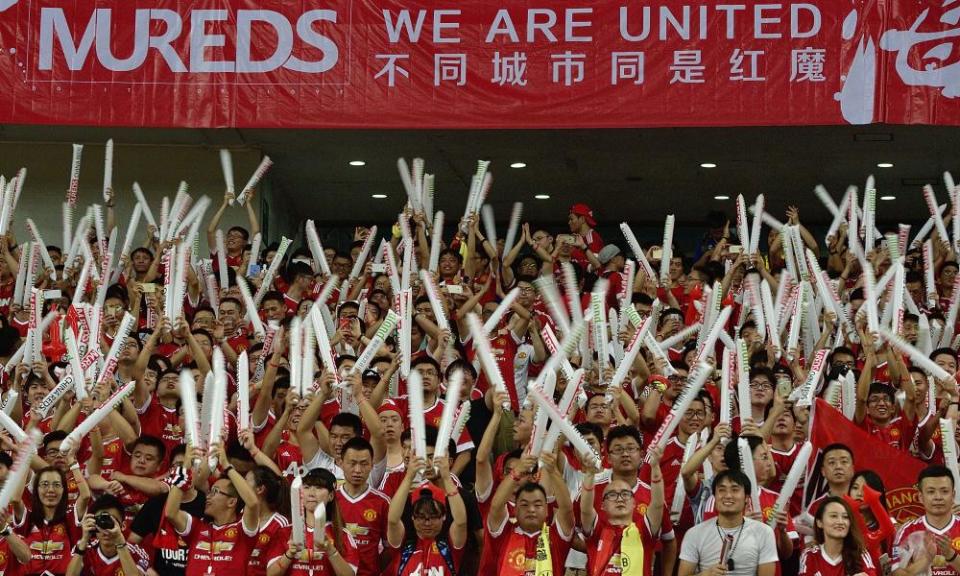Would football fans in Asia embrace a potential European Super League?

In normal times, about 120 fans meet at the 3 Wise Monkeys bar in Mumbai to watch Manchester United games, but if plans for the new European Super League (ESL) go ahead, Prasanth Nair will not be one of them in the future. “It’s bullshit,” he said. “It is sacrificing the ethos of the club. It’s wrong. I will stop supporting.”
But the question is not whether the diehards will stop watching but whether the average fan in Asia will do the same. Will those in Jeddah, Jakarta or Jinan really care if their favourite teams are playing in the ESL or the Champions League? The answer is probably no, but it remains to be seen how lucrative an audience it would be.
Related: European Super League: Chelsea to withdraw amid fan protests – live!
West Asia will be best. “Football fans in the Middle East are very passionate about the clubs, which are the big clubs within the Premier League and La Liga mostly,’’ said Omar al-Raisi, the chief executive of Dantani Sports Group in Abu Dhabi. “They will follow their clubs, regardless of them playing in the Champions League or Europa League so they will definitely watch the Super League. It will be broadcasted, fans will watch and the media will cover it. You don’t suddenly not watch your club’s games.”
How the proposed tournament will change the structure of English football is unlikely to be the priority. “I’ve seen what everyone is objecting to – the sanctity of English football pyramid and all that. To be honest, Middle East and Asian fans won’t be bothered much about that.”
Some of the numbers regularly thrown around by the big clubs about their eastern followings are ludicrous but the vast majority do, however, support the most successful sides. In China, 11 out of the 12 foreign teams with the highest following on Weibo (the country’s version of Twitter) are founder members of this new tournament. Manchester United, Chelsea and Manchester City are top three at just above or below the 10 million mark. Only Bayern Munich are missing, with the German club replaced by Atlético Madrid, down in 21st.
“Chinese fans are interested in domestic competitions but focus mostly on the big teams, those of which lead this ESL initiative,” said Bi Yuan of Titan Sports. “Most Chinese fans take a somehow neutral stance on the future of the project: they are just watching as outsiders.”
In China, as in much of the continent, the media was initially slow to catch on to the seriousness of developments, though online giant Sina Sports was quick to point out that “the Americans have taken over European football”. Given the international reaction to recent financial issues in Chinese football, a certain smugness as Europe tears itself apart over money is understandable.
One problem that Florentino Pérez and Joel Glazer, the chairman and a vice-chairman of the new venture, have to deal with is time. Keep going east past West Asia into India, Southeast Asia, China, Japan, Taiwan and South Korea, home to almost half the world’s population, then Champions League audiences fall sharply as most people are sleeping. “In China, there will be interest but I don’t think broadcasters will pay as much as before,” said Bi. In South Korea, audience share without Son Heung-min (the initial focus there was on Tottenham getting an invite, though a Korea FA official did tell me that Spurs would lose all their fans in the country if Son was not allowed to play for the national team) struggles to get close to 0.5%.
Related: Supporters of the rich six can now see the price we’ve paid for success | Simon Hattenstone
The digital sports media company DAZN, which has been mentioned as being ready to pay $3.5bn for broadcasting rights for the new league, moved last year to offload its Champions League offerings in various Asian countries early after losing money. Games kicking off in the very early hours of the morning do not attract mass audiences. One broadcaster in south-east Asia, the most passionate European-loving region of the continent, said big English Premier League games command audiences several times higher than Champions League matches. Kicking off on Saturday or Sunday evening makes a huge difference.
While there may not be a massive concern about the difference between the ESL and the Champions League, there would be an impact if the Big Six exited the Premier League. “There would be a very significant drop in viewership,” said al-Raisi. BeIn Sports paid $500m (£357m) to renew rights in December. “They will lose audience numbers, which will then decline their advertising revenue and subscription numbers. Which will then cause them to either not bid or bid a very low amount.” ESL games at the weekend would present more of a threat.
Few, surely would want that, even Asian fans of Everton, who would be title challengers without the big six. “Have you seen our results against the lower teams?” asked Lynn Choo of Everton’s Malaysian fan club. “It is disgusting and takes away the beauty of the game. It’s the competition that makes it exciting.”

 Yahoo Sport
Yahoo Sport 





































